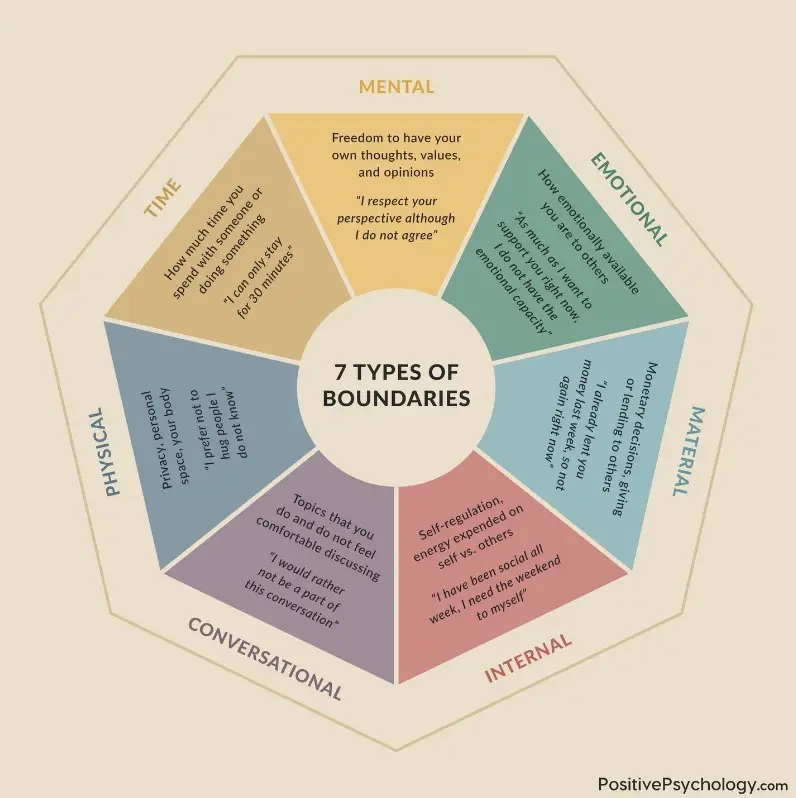Setting Boundaries in Relationships
How this is important for your wellbeing
There are multiple facets of boundaries and how this is important for our well-being, particularly moving into motherhood/parenthood where life shifts its course entirely, and you may need to say no to more things than one.
Personally, clearly defining and communicating my boundaries has not come easy. This is a daily, ongoing practice and something I learned to incorporate in my 30s after beginning therapy (I’m now 33)!
According to Dr Jo Nash - a writer, researcher and psychotherapist, there are 7 types of boundaries:
Physical
Protects your space and body i.e Someone sits uncomfortably close to you, so you move away or say, “I need a little more personal space.” This clearly states that your body and space belongs to you.
Time
Protects your value of time; how long you spend with someone or how long you choose to do something for.
Mental
Protects your right to have your own thoughts, values and opinions, without taking responsibility for other’s. i.e communicating that you feel uncomfortable discussing a certain topic
Emotional
Protects your right to decide how much energy or emotion you have available for others.
Material
Protects your financial resources and materials. i.e communicating that you are on a budget, so instead of heading out for lunch you have brought your own.
Internal
Protects how you choose to self-regulate and how much energy you expend on others
Conversational
Protects your right to decide which topics you do and do not feel comfortable discussing or conversations you do or do not want to be involved in.
How avoiding setting boundaries can affect your health
When we fail to set healthy boundaries for ourselves, this can lead to:
Stress
Feelings of burnout, exhaustion, resentment and anger will start to bubble to the surface. You may even feel anxious or depressed. When we are stressed we are only able to cope with 3 things at a time, when we are not stressed we have the ability to cope with 7. This statistic really hit home for me!
Imbalances in our gut
You may experience issues with your digestive system that are similar to IBS. Our gut is our second brain, when we are stressed or anxious and aren’t aware of this connection, we can mistake these symptoms for a separate issue like IBS or diarrhoea. Think Brain (what are my thoughts and feelings telling me?) > Gut (is this feeling in my gut - nauseous, gassy, cramping; due to stress I’m experiencing/my intuition telling me something or is it a symptom created from something I ate?). This can even be seen in physical symptoms such as adult acne.
Hormone imbalance
Because of the above mentioned health issues, these can also have an effect on your hormones. Remember, everything is inter-related, we can’t expect one system to hold the load for the mind and body, when others are imbalanced.
Poor wellbeing
The definition of wellbeing is “the state of being comfortable, healthy, or happy”. While I feel this definition is quite vague, in short, if you are not feeling either of these three - comfortable, healthy or happy, (which you won’t if you’ve nodded your head in agreeance to any of the top 3), you will more than likely need to do some work on your mental health by reflecting on your boundaries.
*To read more about how stress can affect your health, head to this page
Setting Boundaries with Family
Now that you’ve had a read through of each of the different types of boundaries and how failing to set boundaries can have negative impacts on your health, you should have a better understanding of what you need to personally improve.
We can practice setting boundaries with our family. Some common boundary issues with family may include:
having unexpected and frequent visits
unsolicited parenting advice
unsolicited relationship advice
To protect your boundaries and values, practice:
Being clear and concise. Reflect on how their behaviour makes you feel? What do you need or what do you want to do? If a family member has asked you to do something that feels like a boundary has been crossed and you need more time to decide on your answer, voice this. Usually when we don’t have our boundaries set, we have a habit of people pleasing so we answer the way we think our family wants us to. Take some time to think about your answer and then clearly define your needs at another time when you’re ready to discuss.
For example, a parent is dropping by unannounced. Explain that it is difficult for you when they drop in unexpectedly and that it would be best if they called ahead first. State the times that are best for you to see them and do so without apologising.
Remember, our families only want what is best for us. Sometimes they may think they know us better than ourselves and whilst this can be true, becoming a parent gives you a newfound freedom and inspiration to be the type of parent, you wish to be.
I know for me as a mother, I really think about the example I want to be for Vinnie. They are sponges and copycats, how they behave, act and feel is generally picked up by what they witness from the people closest to them.
Setting Boundaries with Friends
Firstly, it’s important to know what your values are when it comes to friendships. What do you expect and need from a friend? How do you show up as a friend yourself? Establishing this first, will help you set boundaries for the sake of your friendship and will allow you to be clear in expressing your needs.
Some common boundary issues with friends may include:
Your friend is in your “business”
Your friend needs your support but you are feeling overwhelmed or as if they only express their issues and forget to ask how you are going.
The friendship feels one sided.
To align with your values and boundaries with friends, practice:
Having open and honest conversations with how you are feeling, by checking in with yourself first and identifying what you might need or are lacking from the relationship or your new life as a parent. Taking the time to reflect, gives yourself a chance to be clear on what you’re trying to articulate.
Using “I” statements rather than “you” which can cause defensiveness i.e “I appreciate that you are trying to be helpful with your advice and I know you care about me. I am struggling with our parenting differences and would prefer to stick to more neutral topics like activities we share or enjoy.”
Agree to disagree. When topics of conversation become heated, it is ok to have differing opinions.
There are always different dynamics and personalities within friendship groups as well, so you will have different expectations and needs from one friend to another. Remember, a friend worth keeping will understand your need to have appropriate boundaries.
Setting Boundaries with Work
Majority of us spend more time at work, than we do at home or with our families. It’s a sad reality for some, but there are ways you can make your time at work more balanced and productive by setting boundaries for yourself.
Some common boundary issues with work may include:
Work hours and inflexible work arrangements
Unrealistic expectations and deadlines
Taking on more work that is outside of your position description.
To protect your boundaries and workplace values, practice:
Being upfront and assertive with your boundaries as early as the interview stages. If this isn’t an option for you and you have struggled with boundaries since starting at your workplace, it’s not too late to practice this now. Use your family and friends to practice being assertive, as this will give you confidence to mirror this with your work colleagues. This will also improve your communication skills. Creating an honest relationship with your boss, by voicing issues as they come to a head, will also help when practicing being upfront and assertive.
Setting clear structures to your day. Such as time zoning for certain tasks, rather than creating extra long to do lists! Only accepting meetings that you are needed for and have the availability to attend.
Delegating work where possible and saying “no” when you’re at capacity with your workload. If saying no seems scary, again, practice. It is not personal, you can say “No, I am on several deadlines” and suggest a more suitable time. Or you can say “ No, I have no space for additional work at the moment.”
Work tends to become more stressful when we're not growing and learning. Whilst you can make improvements on your actual skillset and development, making improvements on your self care by learning what boundaries you need to put in place, will allow you to be more productive and make your job and workplace more enjoyable.
One of Jay Shetty’s recent podcasts touches on ways to improve work-life balance. For extra tips, I highly recommend this for a listen!
I have given you tips on how you can put boundaries in place for each different relationship, but these are easily transferrable to any situation or person. The long and short of it is that you are identifying your personal needs, voicing them and taking action to live by your values, without guilt or apology. This is a process, not a goal you can hit and tick off your list. Have patience, determination and belief that putting yourself first is ultimately what’s best for you and everyone around you.
Subscribe to our newsletter for your chance to WIN the complete Mama Mvmnt Bundle (Mama Mvmnt + Mama Nourish Ebooks).





